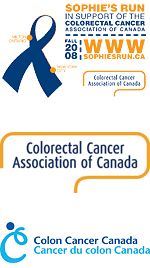What is it?
Colorectal cancer (commonly referred to as “colon cancer”) is the number two cause of cancer death in men and women. Because this deadly disease shows no symptoms in its most curable stages, early detection through regular screening is the key to survival (cure rates are approximately 90%).
Colorectal cancer is cancer in the colon or rectum. It occurs when cells lining the colon or rectum begin to divide rapidly and form small tumours or pre-malignant polyps. Though usually benign, some of these polyps may become malignant or cancerous over time. If these cancerous cells grow into the wall of the colon or rectum, the cancer can spread to other organs (a process called “metastasis”).
Signs and Symptoms of Colorectal Cancer
The following symptoms MAY be caused by colorectal cancer and are usually associated with later stages of the disease and poorer outcomes:
- change in bowel habits;
- blood (either bright red, very dark, black or tarry looking) in the stool;
- diarrhea, constipation, or feeling that the bowel does not empty completely;
- stools which are narrower than usual;
- general abdominal discomfort (frequent gas pains, bloating, fullness, or cramps);
- weight loss for no known reason;
- constant tiredness;
- vomiting.
Risk Factors for Colorectal Cancer
Age: colorectal cancer screening is recommended for everyone over the age of 50.
Additional Risk Factors:
Earlier screening should be considered for individuals with one or more of the following additional risk factors:
- high red/processed meat diet;
- ovarian, endometrial or breast cancer history;
- little/no physical activity;
- ethnic background –Ashkenazi Jewish descent;
- obesity;
- smoking/high alcohol consumption.
High-Risk Factors:
Earlier screening with regular colonoscopies is recommended for individuals with one or more of the following high-risk factors:
- personal history of colorectal polyps;
- inflammatory bowel disease (ulcerative colitis, Crohn's disease);
- family history of colorectal cancer (first degree relative with colorectal cancer);
- familial adenomatous polyposis or hereditary nonpolyposis colorectal cancer.
